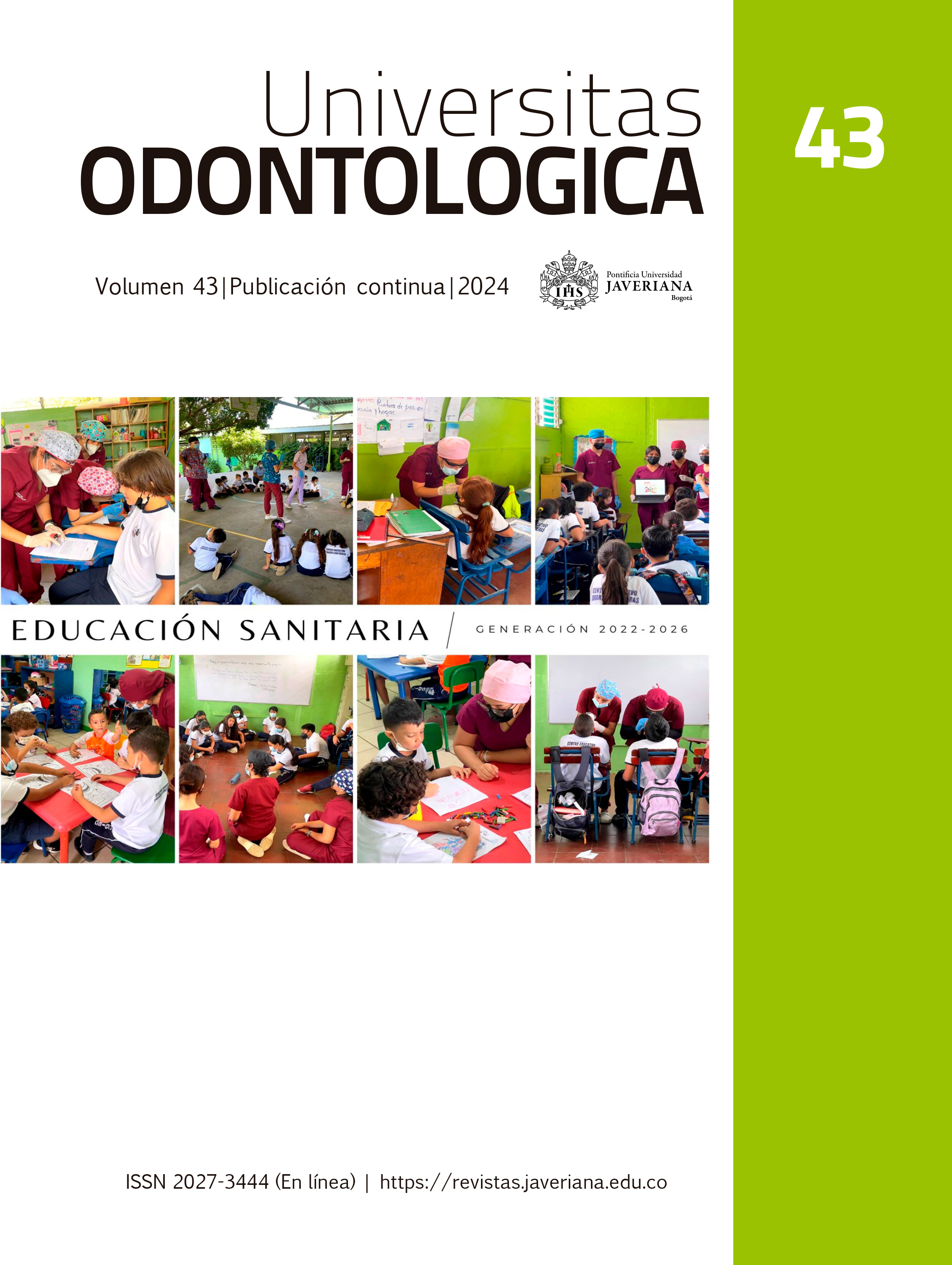Resumen
Antecedentes. Síndrome de Down es el trastorno genético asociado a discapacidad intelectual más prevalente, caracterizado por afectar múltiples sistemas corporales, entre ellos el sistema orofacial, que está ligado a funciones vitales, tales como la deglución y la masticación, fundamentales para el proceso de alimentación. Objetivo: Explorar y describir las características de las funciones orofaciales de deglución y masticación en niños con Síndrome de Down. Métodos. Se realizaron tres búsquedas avanzadas en Pubmed, utilizando los siguientes términos clave y operadores booleanos: (down syndrome) AND (feeding disorders) NOT (review); (down syndrome) AND ((deglutition disorders) OR (dysphagia)) NOT (review); y (down syndrome) AND ((chewing disorders) OR (masticatory dysfunction)) NOT (review). En CINAHL Complete EBSCO se efectuaron tres búsquedas empleando los términos (down syndrome) AND (deglutition disorders) OR (dysphagia); (down syndrome) AND (feeding disorders) NOT (review); y (down syndrome) AND ((chewing disorders) OR (masticatory dysfunction)) NOT (review). Finalmente, se hicieron tres búsquedas en Embase, utilizando los mismos términos que se emplearon en Pubmed. Resultados. Tras realizar la búsqueda, se encontraron un total de 279 artículos, y posterior al proceso de selección, se incluyeron 8 artículos. Además, revisando las referencias de los artículos escogidos, se incluyeron dos estudios. Conclusiones. Los(as) niños(as) con Síndrome de Down presentan alteraciones en la alimentación y en las funciones de la deglución y masticación, desde edades tempranas, por lo tanto, se requiere que los profesionales involucrados en la habilitación y rehabilitación de estas funciones las detecten a tiempo, con el fin de entregar un tratamiento oportuno a cada paciente y su familia.
Antonarakis SE, Skotko BG, Rafii MS, Strydom A, Pape SE, Bianchi DW, Sherman SL, Reeves RH. Down syndrome. Nat Rev Dis Primers. 2020 Feb 6; 6(1): 9. https://doi.org/10.1038/s41572-019-0143-7
de Graaf G, Buckley F, Skotko BG. Estimation of the number of people with Down syndrome in the United States. Genet Med. 2017 Apr 19; (4): 439-47. https://doi.org/10.1038/gim.2016.127
Nazer H J, Cifuentes O L. Malformaciones congénitas en Chile y Latino América: una visión epidemiológica del ECLAMC del período 1995-2008. Rev Med Chil. 2011 Jan; 139(1): 72-78.
Down JL. Observations on an ethnic classification of idiots. 1866. Ment Retard. 1995 Feb; 33(1): 54-56.
Scalioni F, Carrada CF, Abreu L, Ribeiro RA, Paiva SM. Perception of parents/caregivers on the oral health of children/adolescents with Down syndrome. Spec Care Dentist. 2018 Nov; 38(6): 382-390. https://doi.org/10.1111/scd.12321
Marques LS, Alcântara CE, Pereira LJ, Ramos-Jorge ML. Down syndrome: a risk factor for malocclusion severity? Braz Oral Res. 2015; 29: 44. https://doi.org/10.1590/1807-3107BOR-2015.vol29.0044
Doriguêtto PVT, Carrada CF, Scalioni FAR, Abreu LG, Devito KL, Paiva SM, Ribeiro RA. Malocclusion in children and adolescents with Down syndrome: A systematic review and meta-analysis. Int J Paediatr Dent. 2019 Jul; 29(4): 524-541. https://doi.org/10.1111/ipd.12491
Saccomanno S, Martini C, D'Alatri L, Farina S, Grippaudo C. A specific protocol of myo-functional therapy in children with Down syndrome. A pilot study. Eur J Paediatr Dent. 2018 Sep; 19(3): 243-246. https://doi.org/10.23804/ejpd.2018.19.03.14
Faulks D, Collado V, Mazille MN, Veyrune JL, Hennequin M. Masticatory dysfunction in persons with Down's syndrome. Part 1: aetiology and incidence. J Oral Rehabil. 2008 Nov; 35(11): 854-862. https://doi.org/10.1111/j.1365-2842.2008.01877.x.
Proffit W, et al. Ortodoncia contemporánea, 5a Ed. Barcelona, España: Elsevier; 2014.
Jackson A, Maybee J, Moran MK, Wolter-Warmerdam K, Hickey F. Clinical characteristics of dysphagia in children with Down syndrome. Dysphagia. 2016 Oct; 31(5): 663-671. https://doi.org/10.1007/s00455-016-9725-7
Le Révérend BJ, Edelson LR, Loret C. Anatomical, functional, physiological and behavioural aspects of the development of mastication in early childhood. Br J Nutr. 2014 Feb; 111(3): 403-414. https://doi.org/10.1017/S0007114513002699
N'gom PI, Woda A. Influence of impaired mastication on nutrition. J Prosthet Dent. 2002 Jun; 87(6): 667-673. https://doi.org/10.1067/mpr.2002.123229
Anil MA, Shabnam S, Narayanan S. Feeding and swallowing difficulties in children with Down syndrome. J Intellect Disabil Res. 2019 Aug; 63(8): 992-1014. https://doi.org/10.1111/jir.12617
Bermudez BEBV, de Oliveira CM, de Lima Cat MN, Magdalena NIR, Celli A. Gastrointestinal disorders in Down syndrome. Am J Med Genet A. 2019 Aug; 179(8): 1426-1431. https://doi.org/10.1002/ajmg.a.61258
Jackson A, Maybee J, Wolter-Warmerdam K, DeBoer E, Hickey F. Associations between age, respiratory comorbidities, and dysphagia in infants with down syndrome. Pediatr Pulmonol. 2019 Nov; 54(11): 1853-1859. https://doi.org/10.1002/ppul.24458
Cochran E, Breithaupt K, Williams L, Atkins K. Introduction of complementary foods for children with Down syndrome: parent and physician experiences. Phys Occup Ther Pediatr. 2022; 42(3): 333-349. https://doi.org/10.1080/01942638.2021.1981514
Simons JP, Greenberg LL, Mehta DK, Fabio A, Maguire RC, Mandell DL. Laryngomalacia and swallowing function in children. Laryngoscope. 2016 Feb; 126(2): 478-484. https://doi.org/10.1002/lary.25440
Sales AVMN, Giacheti CM, Cola PC, Silva RGD. Qualitative and quantitative analysis of oropharyngeal swallowing in Down syndrome. Codas. 2017 Oct 23; 29(6): e20170005. https://doi.org/10.1590/2317-1782/20172017005
In't Veld WJA, de Pijper I, van Gerven M, van den Engel-Hoek L. Two mastication tests used in children with down syndrome: A feasibility study. J Intellect Disabil Res. 2020 Apr; 64(4): 280-286. https://doi.org/10.1111/jir.12693
Pinheiro DLDSA, Alves GÂDS, Fausto FMM, Pessoa LSF, Silva LAD, Pereira SMF, Almeida LNA. Effects of electrostimulation associated with masticatory training in individuals with down syndrome. Codas. 2018; 30(3): e20170074. https://doi.org/10.1590/2317-1782/20182017074
Jackson A, Maybee J, Moran MK, Wolter-Warmerdam K, Hickey F. Clinical characteristics of dysphagia in children with Down syndrome. Dysphagia. 2016 Oct; 31(5): 663-671. https://doi.org/10.1007/s00455-016-9725-7
O'Neill AC, Richter GT. Pharyngeal dysphagia in children with Down syndrome. Otolaryngol Head Neck Surg. 2013 Jul; 149(1): 146-50. https://doi.org/10.1177/0194599813483445
Huckabee ML, McIntosh T, Fuller L, Curry M, Thomas P, Walshe M, McCague E, Battel I, Nogueira D, Frank U, van den Engel-Hoek L, Sella-Weiss O. The Test of Masticating and Swallowing Solids (TOMASS): reliability, validity and international normative data. Int J Lang Commun Disord. 2018 Jan; 53(1): 144-156. https://doi.org/10.1111/1460-6984.12332
van den Engel-Hoek L, Knuijt S, van Gerven MH, Lagarde ML, Groothuis JT, de Groot IJ, Janssen MC. The 6-min mastication test: a unique test to assess endurance of continuous chewing, normal values, reliability, reproducibility and usability in patients with mitochondrial disease. J Oral Rehabil. 2017 Mar; 44(3): 155-162. https://doi.org/10.1111/joor.12481

Esta obra está bajo una licencia internacional Creative Commons Atribución 4.0.
Derechos de autor 2024 Lorena Ester Sepúlveda Veja, Pablo Martín Méndez, Patricia Vázquez Fernández, Daniel Carreño Henríquez



